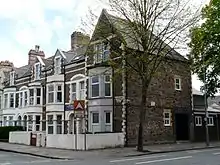Al-Manar Centre
The al-Manar Centre (sometimes referred to as 2 Glynrhondda Street) is a takfirii[1] mosque in the Cathays district of Cardiff, Wales. Founded in 1992, it describes itself as being "one of [the] Ahlus-Sunnah organisations".[2] A widely circulated claim holds that a mosque was registered at this address in 1860, which would make the Al-Manar Centre the oldest mosque in the United Kingdom.[3][4] This has, however, been shown to result from a transcription error in the Register of Religious Sites,[5] making the Liverpool Muslim Institute, established in 1891,[6] the first.
| Al-Manar Centre | |
|---|---|
 | |
| Location | |
| Location | Cathays, Cardiff, Wales, United Kingdom |
| Architecture | |
| Type | Mosque |
| Date established | 1992 |
In 2014, the mosque became the subject of media attention[7] after it emerged that Nasser Muthana and Reyaad Khan, two young men who appeared in a propaganda video for the Islamic State of Iraq and the Levant, and Muthana's brother Aseel, also believed to be fighting in Syria for the same organisation, had worshipped at the mosque. The centre denied that it had played any part in their radicalisation.[8]
See also
References
- "Dani Garavelli: How to counter radicalisation".
- "About us". Al-Manar Centre. Retrieved 5 July 2014.
- "From scholarship, sailors and sects to the mills and the mosques". The Guardian. 18 June 2002. Retrieved 30 November 2008.
- "Islam and Britain". BBC. 2002. Archived from the original on 4 December 2008. Retrieved 30 November 2008.
- Gilliat-Ray, Sophie (July 2010). "The first registered mosque in the UK, Cardiff, 1860': the evolution of a myth". Contemporary Islam. 4 (2): 179–193. doi:10.1007/s11562-010-0116-9. ISSN 1872-0218. S2CID 145759796.
- "Liverpool Mosque and Muslim Institute". Open University. Retrieved 19 May 2014.
- Morris, Steven (23 June 2014). "Father of Cardiff jihadists says his sons were radicalised in 'pop-up' schools". The Guardian. Retrieved 5 July 2014.
- Morris, Steven (4 July 2014). "Cardiff mosque where Isis recruits worshipped says don't blame us". The Guardian. Retrieved 5 July 2014.
